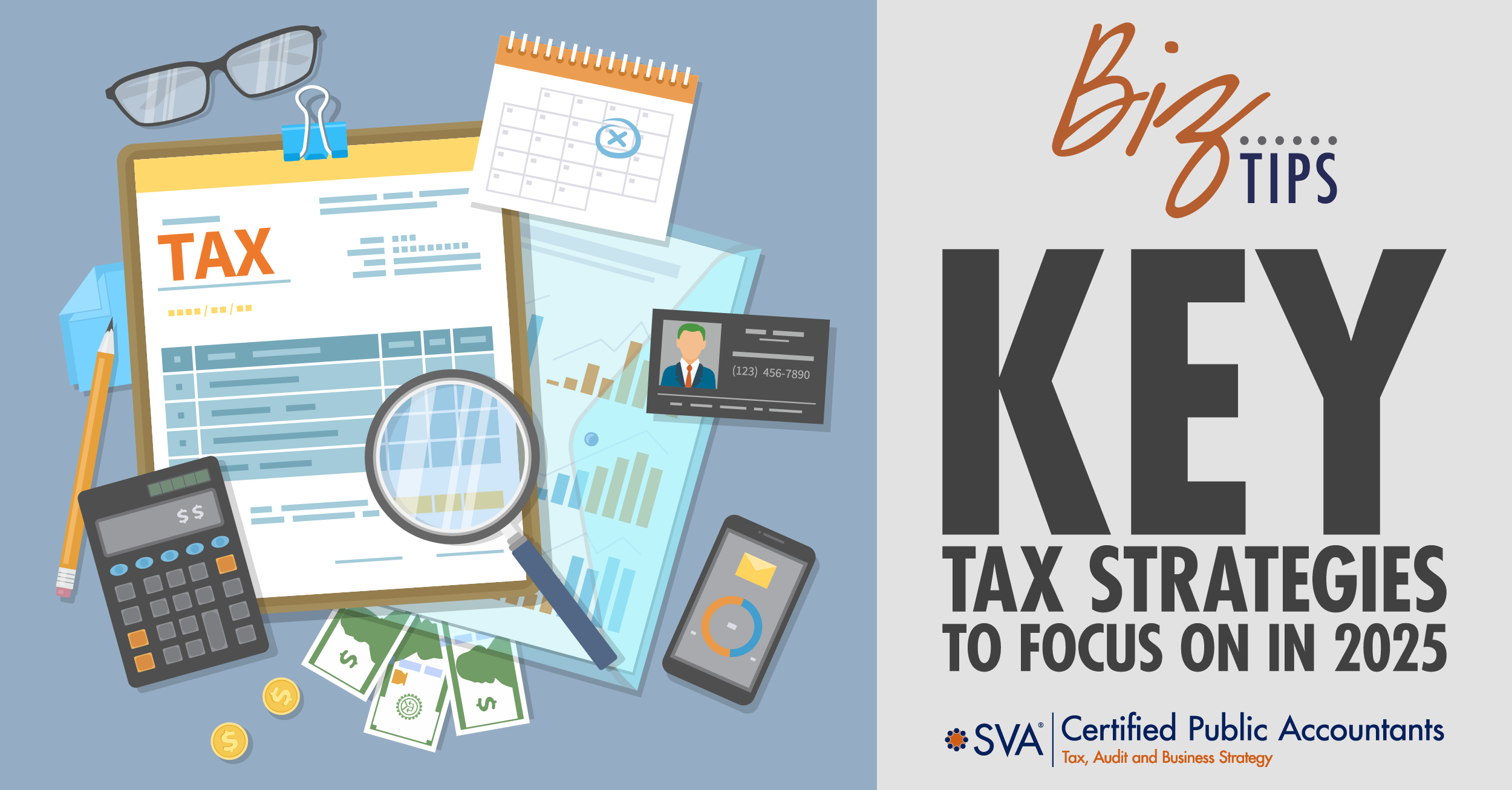As we settle into the new year, now is the perfect time to reset and strategize for 2025. Preparing for upcoming tax changes and making strategic financial decisions can set the stage for long-term success.
The 2025 Tax Landscape: Key Considerations
2025 presents unique opportunities and challenges, especially with potential legislative changes on the horizon. Let’s take a look at some pivotal areas to monitor.
Expiring Provisions of the 2017 Tax Cuts and Jobs Act (TCJA)
Several tax provisions enacted under the TCJA are set to expire at the end of 2025, and it’s important to be ready for potential changes:
| Individual Income Tax Rates |
The top rate could revert from 37% to 39.6%, affecting high-income earners. |
| State and Local Tax (SALT) Deduction Cap |
The current $10,000 limit on SALT deductions may expire, potentially reinstating a full deduction unless extended or modified. |
| Bonus Depreciation |
The provision allowing 100% immediate write-off of qualified business asset purchases is scheduled to end. However, it may be reinstated. Businesses should evaluate capital expenditures accordingly. |
| Corporate Tax Rates |
Corporate tax rates could drop further from 21% to 15%, creating an opportunity for businesses to reassess their entity structure. |
| Tariff Adjustments |
Discussions on replacing some income tax revenue with tariffs could affect cost structures for businesses relying on imports. |
(Download Video Transcript)
Business Tax Planning Priorities
Businesses can benefit from taking a proactive stance to optimize their tax position. Key strategies include:
| Entity Structure Evaluation |
With potential changes in corporate tax rates, now is the time to reassess whether your business should operate as a C corporation, S corporation, or partnership. |
| Maximizing Deductions |
Take advantage of the Qualified Business Income (QBI) deduction by balancing wages and distributions to optimize tax benefits.
Leverage state-specific opportunities, such as Wisconsin’s entity-level tax deduction to circumvent the SALT cap. |
| Reimbursing Business Expenses |
Ensure all business-related personal expenses, such as cell phone, internet, and continuing education costs, are reimbursed by the business. |
| Equipment Investments |
Consider purchasing necessary equipment early in the year to maximize depreciation benefits. |
| Retirement Planning |
If your business lacks a retirement plan, explore options in early 2025. Tax credits up to $5,000 for new plan setup costs make this a particularly advantageous time to act. |
Individual Tax Planning Opportunities
On a personal level, consider these strategies:
| Retirement Contributions |
Maximize contributions to retirement accounts like 401(k)s or IRAs. For those phased out of direct Roth IRA contributions, backdoor Roth conversions remain a powerful tool. |
| Charitable Giving |
Use donor-advised funds to consolidate future charitable contributions into 2025, leveraging a single large deduction while maintaining long-term donation flexibility.
Gift appreciated assets like stocks to avoid capital gains taxes while claiming a full-value deduction.
|
| Income Smoothing and Timing |
Anticipate significant income changes due to events like retirement or asset sales. Adjust the timing of income and deductions to spread taxable events across multiple years, minimizing exposure to higher tax brackets. |
| Roth Conversions |
Take advantage of historically low tax rates by converting traditional IRAs to Roth IRAs, recognizing income now to enjoy tax-free growth later. |
Anticipating Legislative Changes
The political landscape is poised to influence tax policy significantly. With a Republican majority in Congress and the return of President Trump, proposed changes include:
- Reinstating 100% bonus depreciation
- Adjusting SALT deduction caps or eliminating them altogether
- Exempting certain income types, such as Social Security, tips, and overtime pay, from taxation
- Introducing tax exemptions for cryptocurrency transactions
Staying informed about legislative developments will be essential for adapting strategies effectively.
Corporate Transparency Act
The Corporate Transparency Act (CTA) introduces new reporting requirements for many small businesses. While current filing deadlines remain uncertain due to legal challenges, business owners need to be prepared.
Failing to comply with these requirements could result in significant penalties. Consult your advisor to ensure readiness.
Key Steps for 2025 Success
| Engage Early with Advisors |
Collaborative planning with your accountant or financial advisor early in the year ensures you’re prepared to adjust to legislative changes or personal financial events. |
| Stay Informed |
Monitor updates on tax legislation, especially provisions from the TCJA and CTA filing requirements. |
| Focus on Multi-Year Planning |
Instead of treating tax planning as a year-end task, take a holistic approach that spans multiple years, smoothing income and deductions to reduce overall liability. |
| Leverage Available Resources |
Utilize tools like SVA’s tax alerts, webinars, events, and advisory services to stay ahead of the curve. |
As we embrace the opportunities of 2025, thoughtful tax planning can lay the foundation for a successful year. With careful preparation and proactive strategies, you can navigate the shifting tax landscape and achieve your financial goals this year and beyond.
© 2025 SVA Certified Public Accountants

